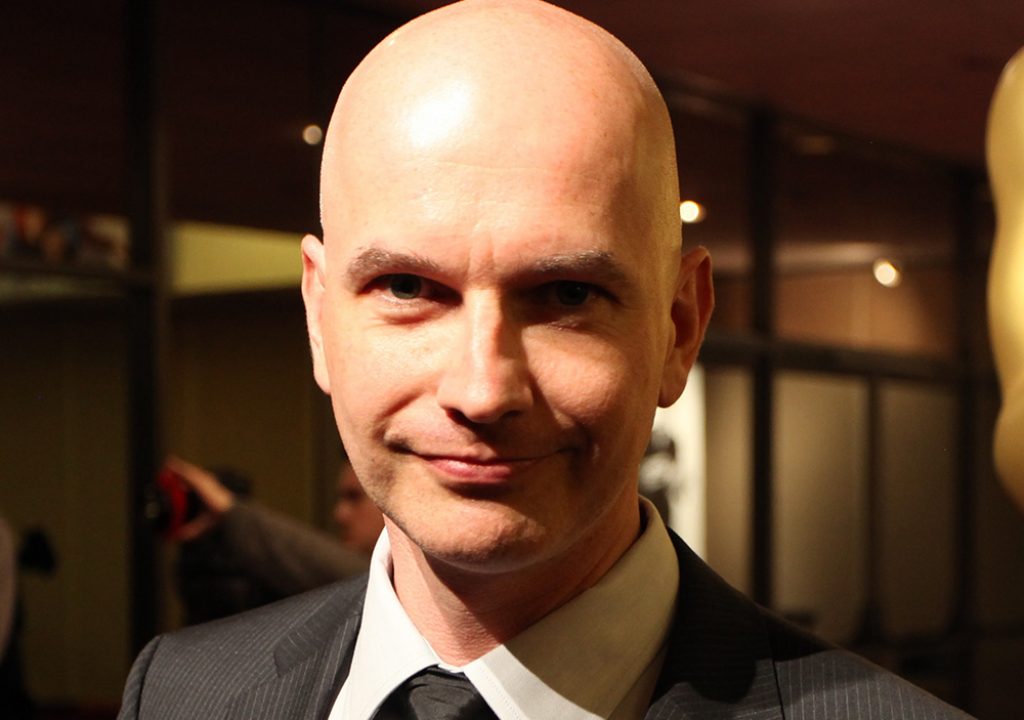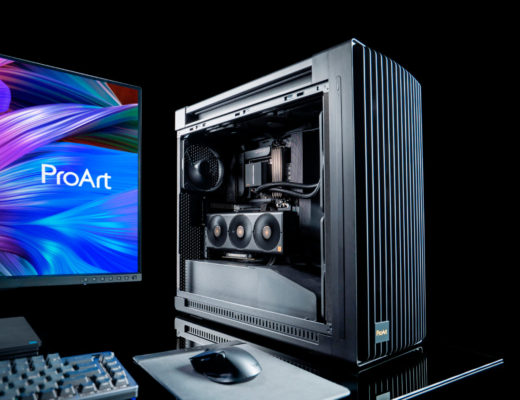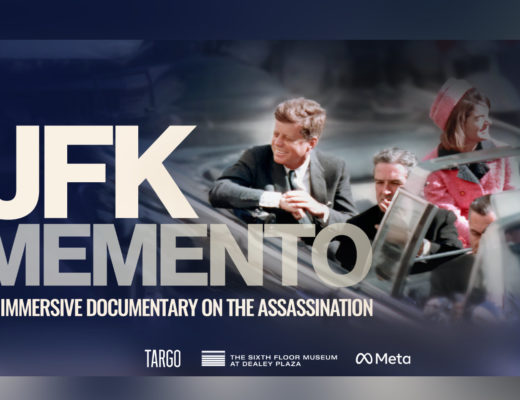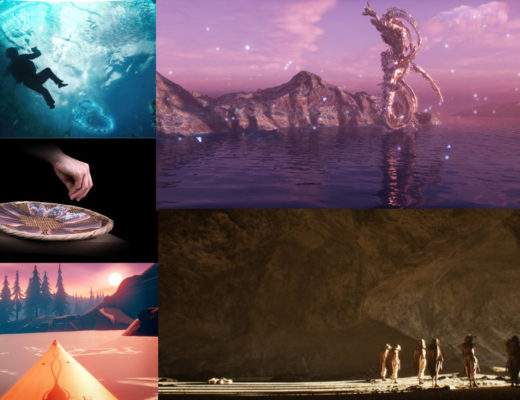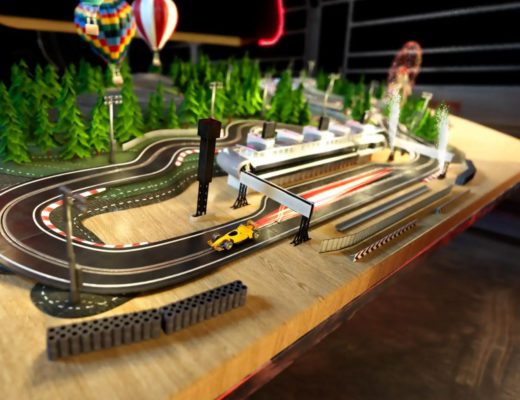Not too long ago I was asked to participate in an industry survey, and one of the questions was around what technology or trend was going to be especially big this year and beyond. Previously I might have mentioned HDR, but it feels like HDR has already arrived, which means it’s time to start focusing what’s next. And what’s next for the industry just might be a full-scale embrace of VR.
Not too long ago I was asked to participate in an industry survey, and one of the questions was around what technology or trend was going to be especially big this year and beyond. Previously I might have mentioned HDR, but it feels like HDR has already arrived, which means it’s time to start focusing what’s next. And what’s next for the industry just might be a full-scale embrace of VR.
One of the biggest challenges around VR comes back to how the technology can be realized conceptually and practically, and that’s something we’ve talked through before. I wanted to know more though, and a film that’s an early selection in the New Media Film Festival provided that opportunity.
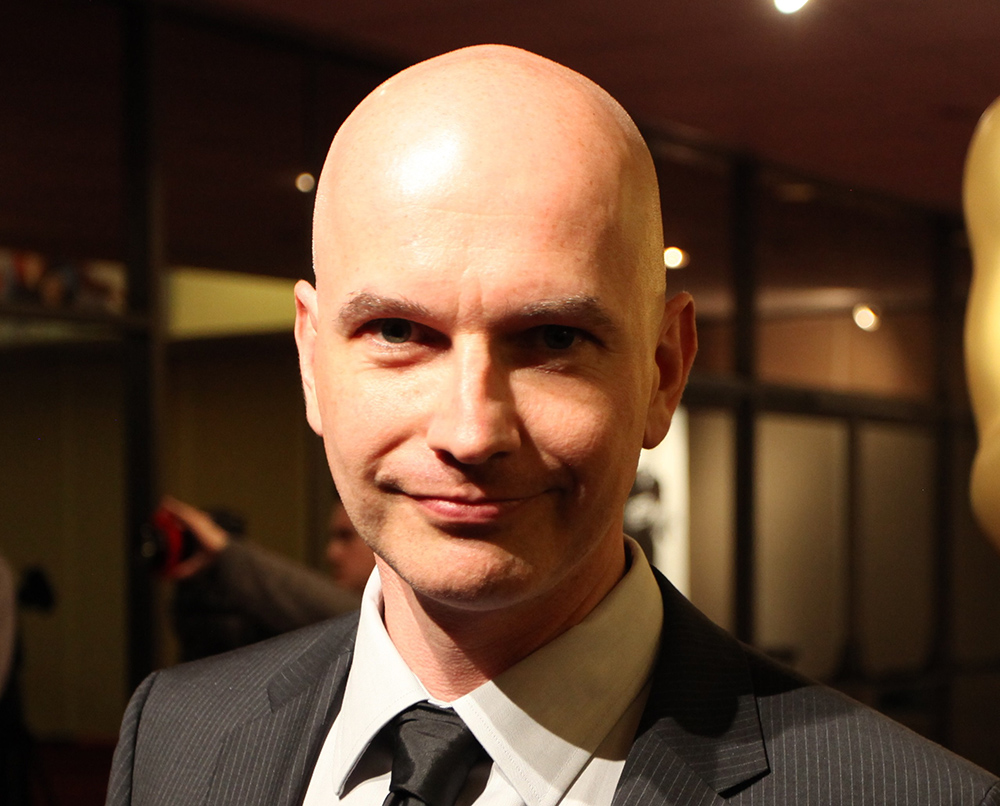 Pluto is an interactive, web based, virtual reality short film directed by Jonathan Kitzen. He’s an award-winning director who takes on technically complicated projects that blend his skills as filmmaker and founder of numerous media related technology companies. I was able to talk with Kitzen about how he got involved with VR, how he sees VR impacting filmmaking, what sort of tools creatives need to familiarize themselves for VR with and plenty more.
Pluto is an interactive, web based, virtual reality short film directed by Jonathan Kitzen. He’s an award-winning director who takes on technically complicated projects that blend his skills as filmmaker and founder of numerous media related technology companies. I was able to talk with Kitzen about how he got involved with VR, how he sees VR impacting filmmaking, what sort of tools creatives need to familiarize themselves for VR with and plenty more.
ProVideo Coalition: Tell us a little bit about your career. What got you interested in film?
Jonathan Kitzen: I started shooting with a super-8 movie camera when I was about 13. I used to make stop motion films. I even used my pet python in a miniature set once. But I don’t think that made me a filmmaker, nor really did going to NYU for film years later. I feel that you become a visual storyteller when that is the best form for the story to take.
Not every story is better as a film, but some can be. It’s a different art form and has a very different set of rules to play with. You can’t, for example, write about water for twenty minutes, and just about water, and expect the reader to maintain intense interest in the same way you can with the visual arts. Many stories are better as books. If films and visual media were the best form of communication the book would be dead, but that is not the case. I respect the medium.
My interest is always in how to use it to show something important.
How have you seen technology impact filmmaking?
Understanding technology is one of the keys to pushing visual storytelling. First off, the tech of film has gotten smaller and cheaper every year. What used to be a special set of tools for the few are now the tools of the many. You can shoot a good film on a cell phone because the sensor in that cell phone is better than a professional video camera of ten years ago. In some ways we’ve hit a technological plateau, in that we haven’t even figured out all the ways to use what we already have.
I just watched Cartel Land and I was impressed by how close in the camera was and how good the film looked. It was a doc that had feature narrative film visual – that was a product of the tech and good storytelling.
In my own work I have used stereoscopic 3D to tell stories that needed 3D to work. The 100 year old 3D of Soldiers’ Stories (3D Winner at New Media Film Festival) is always amazing to the audience, most of whom never knew that there was 3D back then. It helps tell the story of WW1 but also there’s the factor of “I thought James Cameron invented 3D, what do you mean its’ 150 years old?” It helps.
What sort of opportunities do you see with VR in filmmaking?
VR is very similar to 3D. There are many rules to good Stereoscopic films and they play the same in VR. Funny enough, there is a Star Wars VR app out that’s really horrible and unusable because the Stereo is so wide. There’s too much, and the user can’t fuse it. Often we download it to see if they fixed it, in fact just last week we did it at a meeting, and it’s still the same. We all had a good laugh because whoever built it was not really aware of the 3D rules, and I feel sorry for the people who tried it and all got headaches. Like any emerging technology, there are a number of things to be improved on. My fear is that many people will get burned out on bad VR just like what happened with 3D, but so far that hasn’t happened.
VR is a tool, just like a hammer. You have to know what it is used for and not use it to bang out everything. It has its’ place, and its’ own language, and its’ own use. It won’t replace Film or TV or the book but it will be another art. I think the big opportunity with VR is that when it all comes together – an idea with the technology – it can be very transformative and create a feeling of presence, of “being there.” However, I find that 3D can do that too.
Do you think VR will fundamentally change the way filmmakers approach their craft?
Yes, I think filmmakers will have to learn both the production and storytelling aspects of VR. I don’t know about you, but I don’t walk down the street looking at the sky, then my feet, then turn around, then look up, etc.
For example, the reality in which you live now, you’re reading this off a device which is the focus of your attention. What you’re not doing is looking “everywhere”. There’s quite a bit of VR that is built on the premise that this is what people want or expect of VR. I don’t think that’s the case.
In a practical sense, shooting VR is hard, much harder than film. This is because the gear is complex which means more to go wrong. It also means that all sets have to be 360, which is quite a bit more work than just shooting straight ahead. VR shoots have to hide the crew and if you use lighting you have to digitally remove it after. It all gets complicated and expensive very quickly.
So working with VR mean creatives need to deal with a whole new set of hardware and software?
Oh yes! Yes they do. It mostly means that creatives are going to have to get used to “game engine” technologies.
VR is mostly running on game engines, which is to say they’re running on images rendered as polygons. On a more practical level, you get that Star Wars app, which clearly had a real budget but had a horrible execution. Why? Someone didn’t understand how the tech worked or basic vision science.
Right now most of the creatives in VR are new to it, yet there have been people in VR for 30 years. I think creatives might need to realize that the younger generation is often very clueless on this tech and its the older geezers who actually know how it works. That’s very contrary to Hollywood thinking.
How will VR change the expectations of audiences?
I don’t know if it will. I think audiences will accept it as another medium rather than the only medium. Again, the book won’t die with VR. What will change is that much of the content being made now will be forgotten.
I mean, how many people in a year will tell their friends, “Oh do you remember that VR roller coaster ride we tried?” Probably nobody will. I think that when people want to view an apartment or hotel room they will come to expect to see a VR version, because in those instances our natural expectation is to look up, down, left right to get a sense of the place. For this, VR is great.
The expectation will be for better stories, and I think that will happen. Really though, I think the big change will be in AR. I, like many people, believe that augmented reality is going to be far more of a tool for creative story than VR. But there is still much to be developed in that area.
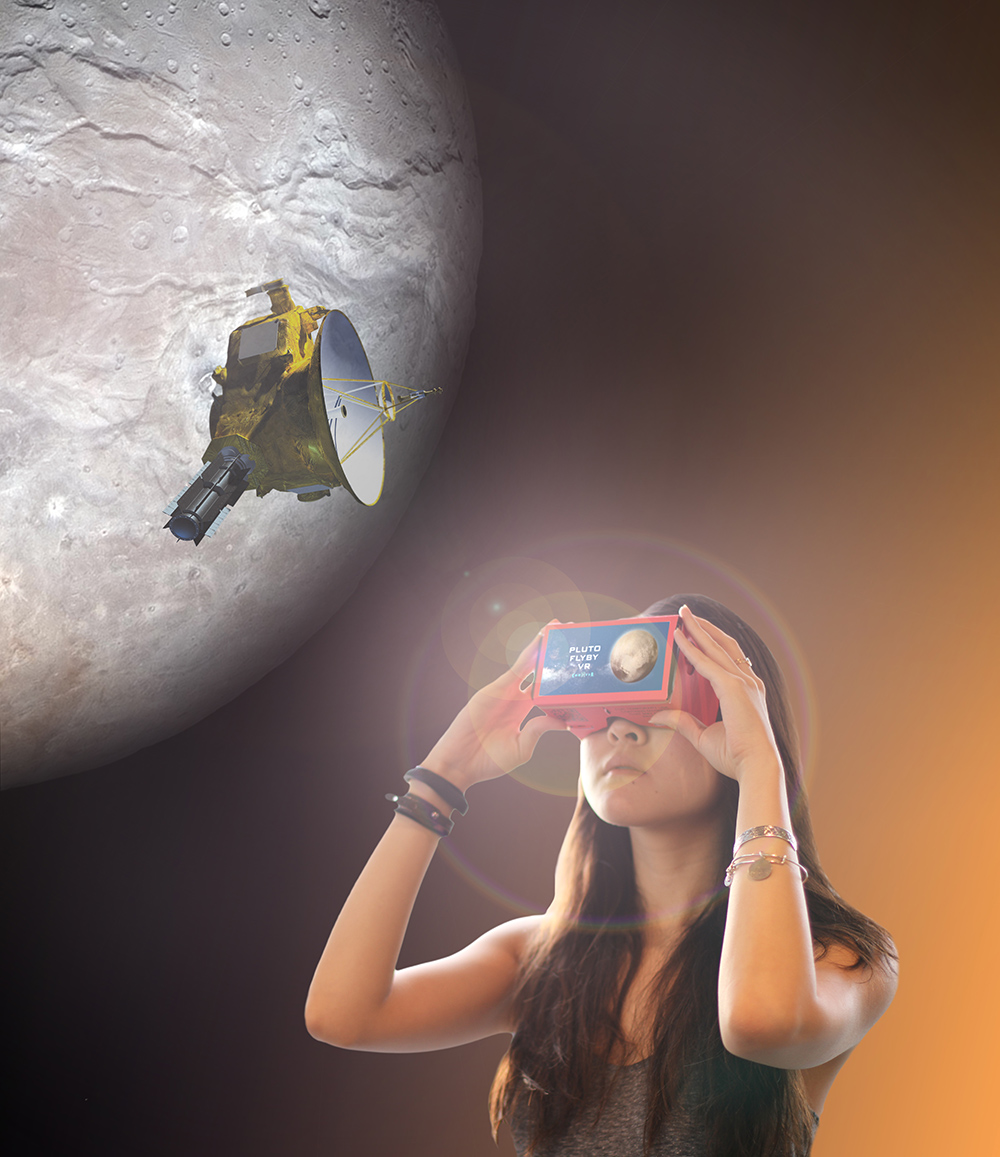
Your interactive, web based, virtual reality short film, Pluto is an early selection of the New Media Film Festival. What can you tell us about this selection and process?
We started with a VR experience because someone in the group wanted to see what it would be like to experience Pluto in VR. In this case you are the New Horizons space ship. It’s really fun.
We figured NASA was doing it but we discovered they actually they don’t make apps for mobile because of security concerns. So in the end we did it. We shared it and people loved it. Then we expanded this to the solar system we’re working on as an AR/VR experience.
What can you tell us about the film itself?
Interestingly, we’re constantly after this elusive thing – how do you create awe? And that’s what we were going for here.
With VR you can do so much. You can let the audience interact, you can force them to view it a certain way, you can go closer or change scale. And that leads to all sorts of questions. Should Pluto be the size of a basketball or beach ball or so big you can’t see all of it? Should you fly over it or be allowed to choose a path? In the end we worked out a new recipe, and we hope it gives you a moment to sit back and ponder your place in life. We wanted to create the god effect in the viewer.
What sort of reactions are you expecting to see and hear from the audience?
Playing it for an audience will be interesting because we have different version. One is VR and one is AR, and I think they’re completely different experiences. My hope is that when they try the AR they have a “I had no idea!” moment.
How will this film impact the projects you’re looking to work on next?
I’m switching to animation next. Because in VR you can feel you’re, God but with animation you can do anything so you really are the God of your animated universe. It made me re-evaluate all the work I am going to do. I like being the first in formats and tech and we’re doing a crazy hand drawn VR experience. Drawing VR is pretty insane, but we’re doing a Disney-like VR clip for fun.
Honestly though, this film work and the amount of work to create VR has made me question what kind of things I want to do, and stories I want to tell. Frankly, VR is so tech intensive that I think you lose some of the story. VR is good for projects that have to “show you something” like Pluto or the mechanics of a motor, or the interior of a building or what it would be like to stand inside an atom. It’s mostly about an experience and less about story. I have stories I want to tell.
Generally speaking, how do you see VR impacting filmmaking and filmmakers in 2016?
Mostly in advertising and sales, and it will be very useful for visualizations of science. I’m not sure there is any cool “must have” experience or story yet. The fact that my film Cosmic Journey 3D became a bootleg VR success story outperforming 99% of free content in 2015 shows you that VR is still maturing. That pirated copy didn’t even have any audio associated with it.
What would you say to a filmmaker who wants to explore some of the possibilities that VR offers, but aren’t sure where to begin?
My advice is start with 3D, figure out how to use it, edit with it, what it looks like and what are the rules. You just can’t skip this if you want to do VR. If you can create a profound experience with it you’ll have something people want to see!

Filmtools
Filmmakers go-to destination for pre-production, production & post production equipment!
Shop Now